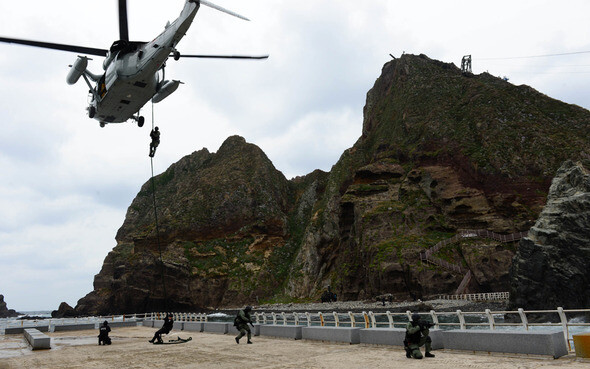hankyoreh
Links to other country sites 다른 나라 사이트 링크
Before signing GSOMIA with Japan, S. Korea calls off regular Dokdo defensive drills

Just before signing the bilateral General Security of Military Information Agreement (GSOMIA) with Japan, the South Korean military abruptly delayed defensive exercises at the island of Dokdo, prompting criticism that the agreement represents a disgraceful capitulation to Japan.
“The navy was planning to hold the Dokdo defensive exercises on Nov. 24. It was planning to brief Defense Minister Han Min-koo and others before proceeding with the exercises as planned, but they were abruptly postponed last week,” a source in the government said on Nov. 22.
“My understanding is that the navy’s abrupt postponement resulted from orders from above,” the source added. While the source did not specify what was meant by “above,” this is presumably a reference to the Defense Ministry and the Blue House.
“I’ve heard that there were concerns that the plan to hold the Dokdo defensive exercises might create tension with Japan if they were reported in the media before the agreement was signed. The government groveled on its own accord,” the source said.
The Dokdo defensive exercises are a regular event that have been held twice a year since 1986, based on the scenario of an attack by an external threat such as the Japan Maritime Self-Defense Force (JMSDF). The exercises are led by the navy, with support from the marines and the coast guard.
This year’s exercises were supposed to involve helicopters and more than 10 naval vessels, including destroyers, just as in past years. Japan has never failed to strongly protest the Dokdo defensive exercises, which it describes as “an infringement of its territorial rights to Takeshima,” as Dokdo is called in Japan.
The government apparently pushed back the Dokdo defensive exercises out of the desire to avoid friction with Japan before the signing of the GSOMIA. Over the past month, the government has been swiftly moving forward with the agreement. It announced the resumption of negotiations with Japan on Oct. 27, held a meeting of vice ministers on Nov. 17, voted on the agreement in the cabinet meeting on Nov. 22 and is planning to sign the agreement on Nov. 23.
There has been sharp criticism of the government’s efforts to ram through GSOMIA despite the opposition of a majority of South Koreans, amid the political fallout of the Choi Sun-sil scandal, in which South Korean President Park Geun-hye is embroiled. A Gallup Korea poll from Nov. 18 found that far more respondents were opposed to the agreement (59%) than those that supported it (31%). The delay of the Dokdo defensive exercises is likely to cause the agreement to be viewed as degrading and servile as well.
“Maritime mobility drills were supposed to occur from Nov. 23 to 25, and it‘s true that we had been planning to hold the Dokdo defensive exercises at that time. But we delayed the Dokdo defensive exercises until December because there was bad weather in the forecast and because we thought it would be better to keep an eye on North Korea on the sixth anniversary of the shelling of Yeonpyeong Island,” said a source in the navy.
By Park Byong-su, senior staff writer
Please direct questions or comments to [english@hani.co.kr]
Editorial・opinion
![[Editorial] Does Yoon think the Korean public is wrong? [Editorial] Does Yoon think the Korean public is wrong?](https://flexible.img.hani.co.kr/flexible/normal/500/300/imgdb/original/2024/0417/8517133419684774.jpg) [Editorial] Does Yoon think the Korean public is wrong?
[Editorial] Does Yoon think the Korean public is wrong?![[Editorial] As it bolsters its alliance with US, Japan must be accountable for past [Editorial] As it bolsters its alliance with US, Japan must be accountable for past](https://flexible.img.hani.co.kr/flexible/normal/500/300/imgdb/original/2024/0417/6817133413968321.jpg) [Editorial] As it bolsters its alliance with US, Japan must be accountable for past
[Editorial] As it bolsters its alliance with US, Japan must be accountable for past- [Guest essay] Amending the Constitution is Yoon’s key to leaving office in public’s good graces
- [Editorial] 10 years on, lessons of Sewol tragedy must never be forgotten
- [Column] A death blow to Korea’s prosecutor politics
- [Correspondent’s column] The US and the end of Japanese pacifism
- [Guest essay] How Korea turned its trainee doctors into monsters
- [Guest essay] As someone who helped forge Seoul-Moscow ties, their status today troubles me
- [Editorial] Koreans sent a loud and clear message to Yoon
- [Column] In Korea’s midterm elections, it’s time for accountability
Most viewed articles
- 1‘Right direction’: After judgment day from voters, Yoon shrugs off calls for change
- 2[Editorial] Does Yoon think the Korean public is wrong?
- 3[Editorial] As it bolsters its alliance with US, Japan must be accountable for past
- 4Where Sewol sank 10 years ago, a sea of tears as parents mourn lost children
- 5Japan officially says compensation of Korean forced laborers isn’t its responsibility
- 6Strong dollar isn’t all that’s pushing won exchange rate into to 1,400 range
- 7[Guest essay] Amending the Constitution is Yoon’s key to leaving office in public’s good graces
- 8[Guest essay] How Korea turned its trainee doctors into monsters
- 9[News analysis] Watershed augmentation of US-Japan alliance to put Korea’s diplomacy to the test
- 10[Column] Brazil, Egypt and Korea